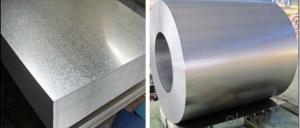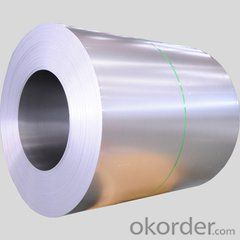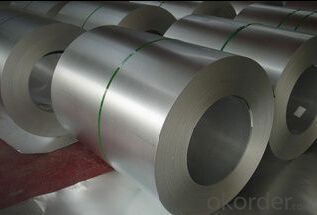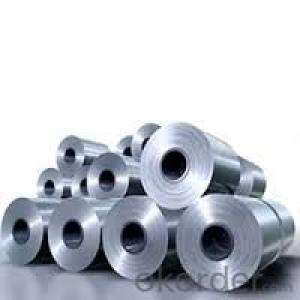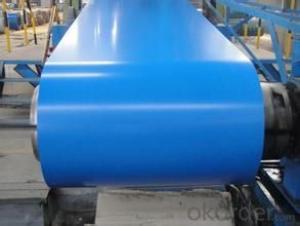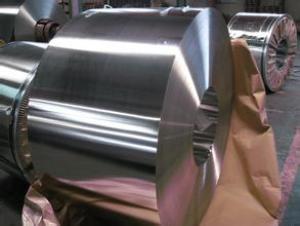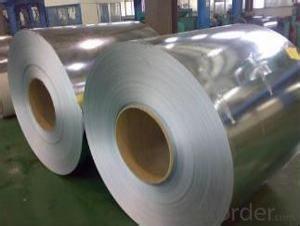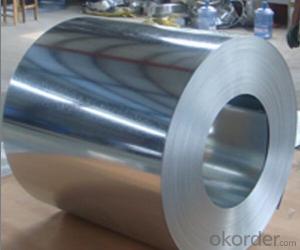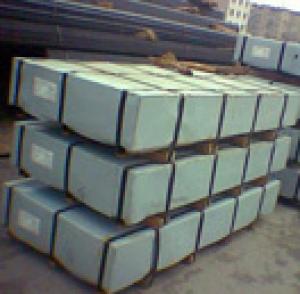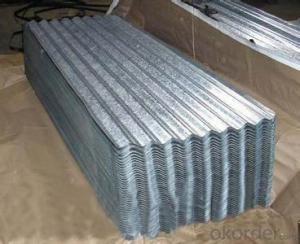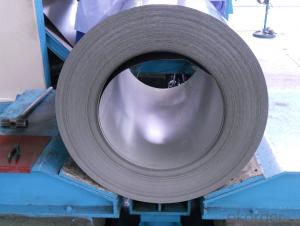Structure of Hot-Dip Galvanized Steel Sheet
- Loading Port:
- China main port
- Payment Terms:
- TT OR LC
- Min Order Qty:
- 25 m.t.
- Supply Capability:
- 10000 m.t./month
OKorder Service Pledge
OKorder Financial Service
You Might Also Like
1.Structure of Hot-Dip Galvanized Steel Sheet Description:
Hot-dip galvanized steel coils are available with a pure zinc coating through the hot-dip galvanizing process. It offers the economy, strength and formability of steel combined with the corrosion resistance of zinc. The hot-dip process is the process by which steel gets coated in layers of zinc to protect against rust. It is especially useful for countless outdoor and industrial applications. Production of cold formed corrugated sheets and profiles for roofing, cladding, decking, tiles, sandwich walls, rainwater protective systems, air conditioning duct as well as electrical appliances and engineering.
2.Main Features of the Hot-Dip Galvanized Steel Sheet:
• Excellent process capability
• Smooth and flat surface
• Workability, durability
• Excellent anticorrosive property
• High strength
• Good formability
• Good visual effect
3.Hot-Dip Galvanized Steel Sheet Images
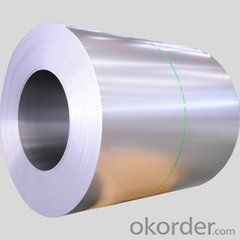
4.Hot-Dip Galvanized Steel Sheet Specification
Standard: ASTM, JIS,EN
Grade: CS, DX51D+Z,SGCC, SS 230~550,S220GD+Z~S550GD+Z, SGC340~SGC570
Thickness: 0.1mm~5mm
Width: max 2000mm
Coil weight:3-12 MT
Coil ID:508/610mm
Surface structure: zero spangle, regular spangle or minimum spangle
Surface treatment: Chromate treatment, Oiled/dry, skinpassed/non-skinpassed
Packing: Standard seaworthy export package
Technology test results:
Processability | Yield strength | Tensile strength | Elongation % | 180°cold-bending |
Common PV | - | 270-500 | - | d=0,intact,no zinc removal |
Mechanical interlocking JY | - | 270-500 | - | d=0,intact,no zinc removal |
Structure JG | >=240 | >=370 | >=18 | d=0,intact,no zinc removal |
Deep drawn SC | - | 270-380 | >=30 | d=0,intact,no zinc removal |
EDDQ SC | - | 270-380 | >=30 | d=0,intact,no zinc removal |
5.FAQ of Hot-Dip Galvanized Steel Sheet
We have organized several common questions for our clients,may help you sincerely:
1.How about your company?
A world class manufacturer & supplier of castings forging in carbon steel and alloy steel,is one of the large-scale professional investment casting production bases in China,consisting of both casting foundry forging and machining factory. Annually more than 8000 tons Precision casting and forging parts are exported to markets in Europe,America and Japan. OEM casting and forging service available according to customer’s requirements.
2.How to guarantee the quality of the products?
We have established the international advanced quality management system,every link from raw material to final product we have strict quality test;We resolutely put an end to unqualified products flowing into the market. At the same time, we will provide necessary follow-up service assurance.
3. How long can we receive the product after purchase?
Usually within thirty working days after receiving buyer’s advance payment or LC. We will arrange the factory manufacturing as soon as possible. The cargo readiness usually takes 15-30 days, but the shipment will depend on the vessel situation.
- Q: What are the typical tolerances for steel coils?
- The typical tolerances for steel coils depend on various factors such as the specific grade of steel, the manufacturing process, and the intended application. However, some common tolerances for steel coils include thickness tolerances of +/- 0.005 to 0.010 inches, width tolerances of +/- 0.020 to 0.050 inches, and length tolerances of +/- 0.125 to 0.250 inches. These tolerances ensure that the steel coils meet the required specifications and can be used efficiently in different industries such as automotive, construction, and manufacturing.
- Q: What are the main factors that affect the price of steel coils?
- The main factors that affect the price of steel coils are the cost of raw materials, supply and demand dynamics, production and transportation costs, changes in government policies and regulations, and global economic conditions.
- Q: What are the different types of steel surface finishes for coils?
- There are several types of steel surface finishes for coils, including hot rolled, cold rolled, galvanized, and coated finishes. Each finish offers unique properties and characteristics, such as improved strength, corrosion resistance, or aesthetic appeal. The choice of finish depends on the specific application and desired outcome for the steel coils.
- Q: What is the difference between steel coils and steel sheets?
- Steel coils and steel sheets, although both forms of steel, exhibit distinct differences. Steel coils, which are long rolls of steel wound into a coil shape, are typically produced at a steel mill and serve as raw materials for further processing or manufacturing. Various industries, including automotive, construction, and appliance manufacturing, commonly utilize steel coils in the production of items such as pipes, tubes, and automotive parts. Conversely, steel sheets are flat pieces of steel that are typically derived from steel coils. These sheets come in different sizes and thicknesses, making them versatile for various applications. Construction projects, such as roofing, siding, and structural components, often employ steel sheets. Additionally, they are utilized in manufacturing processes like stamping, forming, and fabricating diverse products. One primary distinction between steel coils and steel sheets lies in their shape and form. Steel coils adopt a cylindrical, rolled form, whereas steel sheets possess a flat, rectangular structure. This dissimilarity in shape renders steel coils more suitable for continuous production processes, while steel sheets find application in scenarios that demand flat surfaces. Another variation pertains to the handling and transportation of these steel forms. Due to their large size and weight, steel coils necessitate specialized equipment like coil cars or cranes for transport and storage. Conversely, steel sheets can be conveniently stacked, transported, and stored using conventional methods. Lastly, the processing requirements for steel coils and steel sheets differ. Steel coils often undergo additional processing steps, such as slitting, cutting, or coating, to meet specific customer requirements. Conversely, steel sheets may require minimal processing before being utilized in their intended applications. In summary, steel coils and steel sheets exhibit variances in shape, handling, transportation, and processing requirements. Steel coils, in their rolled, cylindrical form, are utilized for further processing, while steel sheets, cut from coils, serve specific applications. Recognizing these distinctions is crucial when selecting the appropriate steel form for a particular project or manufacturing process.
- Q: How are steel coils inspected for edge quality using visual inspection?
- To ensure that steel coils meet the necessary standards and specifications, visual inspection methods are employed to assess their edge quality. This involves carefully examining the edges of the coils to identify any defects or imperfections that may have occurred during manufacturing or handling. During this inspection process, trained inspectors visually assess the edges of the steel coils for various parameters, such as burrs, cracks, unevenness, roughness, and other irregularities that could impact the steel's quality and performance. To conduct these assessments, they utilize specialized tools like magnifying glasses, microscopes, or cameras to closely observe and analyze the edges. Each coil is meticulously inspected by the inspectors to detect any signs of defects that could potentially affect the steel's functionality or integrity. They pay meticulous attention to detail, ensuring that the edges are smooth, devoid of sharp edges or protrusions, and possess consistent dimensions throughout the coil. Apart from visual inspection, inspectors may also employ specific testing methods like dye penetrant testing or ultrasonic testing to further evaluate the quality of the steel coil edges. These supplementary tests aid in detecting any hidden defects that may not be visible to the naked eye. As a whole, visual inspection plays a vital role in the quality control process for steel coils by allowing for the identification and elimination of edge defects that could compromise the steel's performance and durability. By ensuring that the edges meet the required standards, visual inspection helps to uphold the quality and dependability of the steel coils.
- Q: What materials are used to make steel coils?
- Steel coils are primarily made from a material called steel, which is an alloy composed mainly of iron and carbon. The specific type of steel used to make coils depends on the desired properties and applications. Generally, carbon steel is the most common type used, as it offers strength, durability, and versatility. Other alloying elements may be added to enhance certain properties or characteristics of the steel, such as manganese, silicon, nickel, or chromium. The production of steel coils involves melting down the raw materials, refining the molten steel, and then shaping it into coils using specialized equipment and processes.
- Q: what do they use to make stainless steel?and can stainless steel be melted again and again without losing it's Specifications
- Components Of Stainless Steel
- Q: Heard some steel companies like TATA Steel and JSW are in good performance. can some one suggest me if its good time to invest in steel industry ?
- I feel metal stocks can give some return now if you invest.
- Q: How are steel coils manufactured?
- Steel coils are manufactured through a multi-step process that involves heating and shaping steel slabs, followed by passing them through a series of rolling mills to reduce their thickness and increase their length. The coils are then cooled, inspected for quality, and finally, wrapped and ready for shipping.
- Q: Are steel coils used in agricultural equipment manufacturing?
- Yes, steel coils are commonly used in agricultural equipment manufacturing. Steel coils are used to create various components such as frames, brackets, and supports, which are essential for the construction and durability of agricultural equipment. The strength and versatility of steel make it a preferred material choice for manufacturing agricultural machinery.
Send your message to us
Structure of Hot-Dip Galvanized Steel Sheet
- Loading Port:
- China main port
- Payment Terms:
- TT OR LC
- Min Order Qty:
- 25 m.t.
- Supply Capability:
- 10000 m.t./month
OKorder Service Pledge
OKorder Financial Service
Similar products
Hot products
Hot Searches
Related keywords
